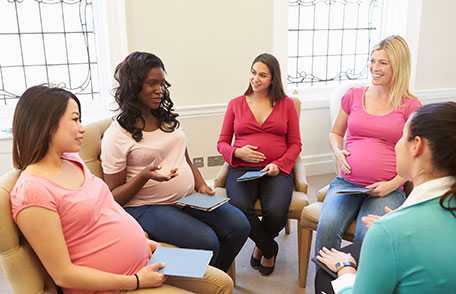Pregnant? Get vaccinated.

Learn about the vaccines you need before and during your pregnancy to help protect yourself and your newest family member from serious diseases.
Vaccines are an important part of planning and having a healthy pregnancy. If you are planning to get pregnant, check with your doctor to make sure you are up-to-date on your vaccines. If you are pregnant now, CDC, the American Academy of Pediatrics, the American College of Nurse midwives and many other professional medical groups recommend you get two vaccines during your pregnancy:
- Tdap to help protect against whooping cough (pertussis)
- A flu shot to help protect against influenza (flu)
Thinking about having a baby?
If you are thinking about getting pregnant, you may need to get some vaccines before you actually get pregnant. In fact, your doctor may need to give you vaccines several weeks before you become pregnant because it could take a while for your body to build up disease protection (immunity) after getting vaccinated. Some vaccine-preventable diseases, such as rubella , can lead to serious complications for the developing baby, including birth defects. But you should not get the vaccine to prevent rubella if you are currently pregnant. Therefore, planning ahead is very important.
Learn why Laura decided to get the whooping cough vaccine in her 3rd trimester and how her baby girl was born with some protection against the disease. Also available on YouTube.
Pregnant? Vaccines Will Help Protect You and Your Baby
During your pregnancy, you should get vaccines against both the flu (if you haven’t already received the vaccine during the current flu season) and whooping cough. These vaccines not only help protect you by preventing illnesses and complications, but they also pass on some protection to your baby after birth.
If you are pregnant, you are at increased risk for serious complications from the flu. Changes in your immune, heart, and lung functions during pregnancy make you more likely to get seriously ill from the flu. While flu vaccines can vary in how well they work, during seasons when the vaccine viruses are well-matched to circulating viruses, flu vaccine has been shown to reduce the risk of getting sick with flu by about half. Flu vaccine also has been shown to similarly protect against flu-related hospitalizations. So when you get a flu shot when pregnant, you’ll help protect yourself from getting sick from the flu. Though not specifically examined among pregnant women, there are some studies that suggest that flu vaccination can make illness milder among people who do still get sick.
Another benefit of getting a flu shot during your pregnancy is that you’ll pass antibodies on to your developing baby. Children younger than 6 months are too young to get a flu vaccine, but they are at high risk of being hospitalized from flu. If you get vaccinated during your pregnancy, your baby will be born with flu protection that can last several months. There also is some evidence that pregnant women who get the flu vaccine may be less likely to have a preterm delivery which can be harmful to their babies.
Whooping cough is serious for your baby. If your baby catches whooping cough, he or she can develop serious complications or even die from the disease. About half of babies younger than one year old who get whooping cough end up in the hospital. When you get the whooping cough vaccine during pregnancy, your body creates and passes antibodies to your baby before birth. These antibodies provide your baby some short-term protection from whooping cough in early life. Plus, you’ll have protection so that you are less likely to pass whooping cough on to your baby.
Timing of Maternal Vaccinations
You can get the flu shot at any time during your pregnancy. Flu activity is usually the highest between December and February, but seasonal flu outbreaks can happen as early as October and last as late as May.
You should get the whooping cough vaccine between 27 and 36 weeks of pregnancy, preferably during the earlier part of this time period.
Safe Disease Protection
Millions of pregnant women have safely received flu shots for many years. CDC continues to gather data on safety of flu shots during pregnancy. There is a lot of evidence to show that flu vaccines can be safely given to women during their second and third trimesters of pregnancy and it will not put you at increased risk for pregnancy complications. There is less data to show the safety of flu vaccines in pregnant women during the first trimester.
The whooping cough vaccine also is very safe for you and your baby. Additionally, getting it during pregnancy will not put you at increased risk for pregnancy complications like birth weight or preterm delivery.
- Page last reviewed: August 7, 2017
- Page last updated: August 7, 2017
- Content source:
- National Center for Immunizations and Respiratory Diseases
- Page maintained by: Office of the Associate Director for Communication, Digital Media Branch, Division of Public Affairs




 ShareCompartir
ShareCompartir
